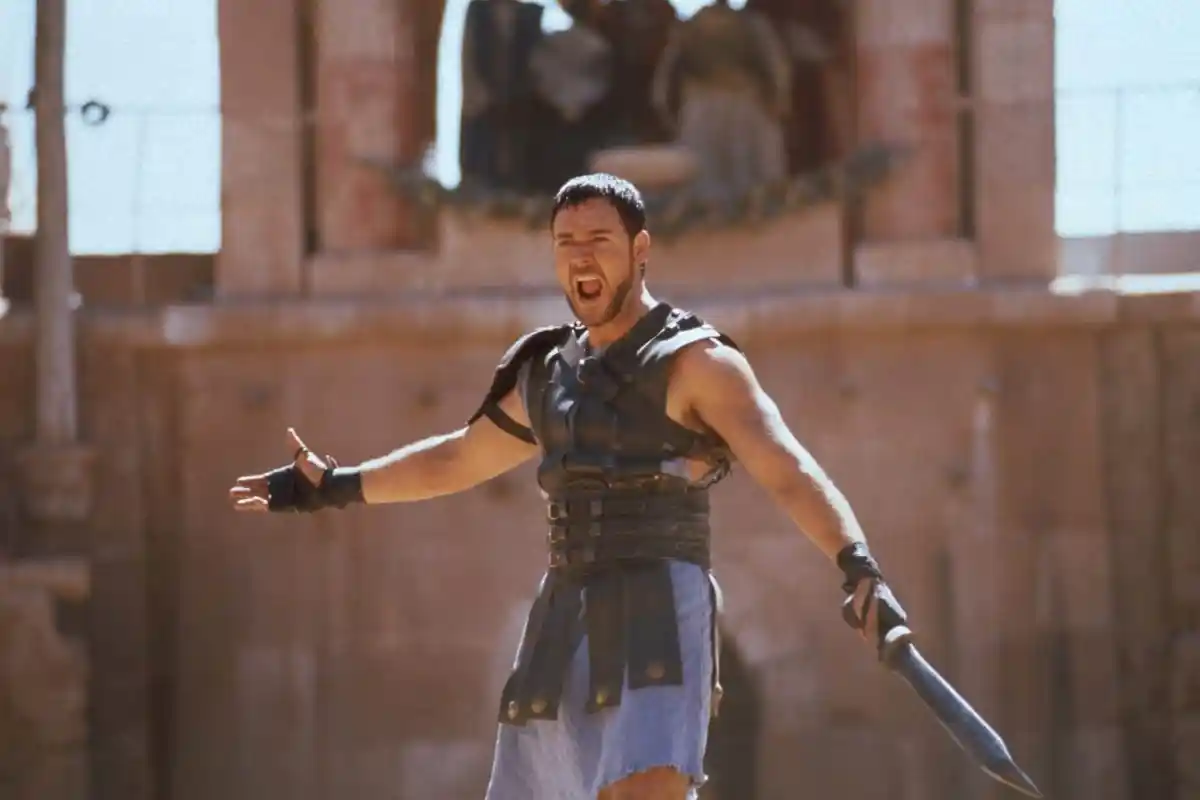Twenty years after its original release, Gladiator remains a triumph of Hollywood spectacle. However, Gladiator is not merely an example of spectacle, but a celebration of it.
Gladiator was a runaway success. It was a massive summer blockbuster, ranking as the third highest-grossing film of the year at the domestic box office and second highest-grossing at the global box office. Several of the film’s key lines have imprinted themselves on popular culture.
It was also an awards darling, receiving 12 nominations at the Academy Awards and winning five statues, including Best Picture and Best Actor. The film’s awards success might be seen to reflect the time when the Oscars more overtly overlapped with popular taste. Its triumph is positioned between Best Picture wins for other smashes like Titanic and The Lord of the Rings: The Return of the King.
However, Gladiator also provides a point of intersection with another more enduring strand of Best Picture winners. It belongs just as readily alongside The Artist or Argo as a celebration of the art of movie-making. Gladiator is a film that functions as a loving ode to mass entertainment, to the power of narrative, and to the glory of crowd-pleasing spectacle.
This is obvious in terms of production. Gladiator is the kind of Roman-themed epic that was tremendously popular in the middle of the 20th century — typified by films like Ben Hur, Spartacus, and Cleopatra. Director Ridley Scott works hard to make sure that this production value is visible on screen. Gladiator is a lavish production, one that hearkens back to classic Hollywood studio filmmaking.

The story of Gladiator is fairly straightforward. General Maximus Decimus Meridius (Russell Crowe) is chosen by Marcus Aurelius (Richard Harris) to succeed him as emperor and convert the Roman Empire into a Republic. Marcus’ son, Commodus (Joaquin Phoenix), learns of this and conspires to have Maximus and his entire family murdered.
Maximus survives and escapes but is taken as a slave and sold to Proximo (Oliver Reed). Maximus is forced to fight as a gladiator for the entertainment of the crowds. He eventually travels to Rome, where he finds himself caught up in a daring plot orchestrated by Senator Gracchus (Derek Jacobi) and Marcus’ daughter Lucilla (Connie Nielsen) to wrest power from Commodus.
This in no way reflects the history of Rome. The film acknowledges as much. At one point, Maximus and his fellow gladiators find themselves cast as the expected losers in a recreation of the Battle of Carthage. Naturally, Maximus pulls off a stunning surprise victory. “My history’s a little hazy,” confesses Commodus, “ but didn’t the barbarians lose the battle of Carthage?”
Gladiator is built around the importance of stories and how they are told. The truth is secondary. It is a testament to the power of spectacle in shaping everything else around it. “The beating heart of Rome is not the marble of the senate,” Gracchus explains to a colleague, “it’s the sand of the Colosseum.” Gladiator suggests that the Senator is more correct than even he might think.
Gladiator initially seems quite skeptical of the crowd-pleasing entertainment at its core. Scott shoots the action in a very visceral way, placing particular emphasis on the brutality of these games. Gladiator repeatedly stresses that the participants in these games are slaves and that they live their lives in fear and terror for the satisfaction of the masses.

After his first victory, Maximus taunts the crowd. “Are you not entertained?” he demands, as much an accusation as a question. Gracchus understands that Commodus is planning to use the gladiator games to distract the public from his own inadequate and tyrannical rule. “He’ll bring them death — and they will love him for it,” Gracchus sighs, resigned.
There is some indication that Marcus Aurelius frowned upon the use of such “bread and circuses” to placate the masses, with Proximo confessing that it was the previous emperor who drove his troupe out of Rome. This fits with the perpetual anxiety about the relationship between mass culture and the health of a population, the fear that spectacle might numb a population into apathy.
To be fair, this is a complicated issue. On the one hand, these sorts of fears have accompanied every sort of mass media from film to television to the internet. There is a sense of moral panic about the capacity of a population to deal with this sort of entertainment. Maximus himself seems horrified that Lucilla’s son Lucius (Spencer Treat Clark) is allowed to watch the gladiatorial games.
At the same time, it is an understandable anxiety in a world where the President of the United States is a former reality television star who has explicitly instructed his staff to treat each day like an episode of television and who is obsessed with ratings. There is something discomforting in the way that the media reports on issues like politics in the style of sports coverage.
However, despite acknowledging the dangers of spectacle, Gladiator ultimately makes a strong argument in favor of the power of mass entertainment. The movie reserves something close to religious awe for the power of these spaces. “I didn’t know men could build such things,” remarks Juba (Djimon Hounsou) as he takes in the sheer scale of the Colosseum.

Repeatedly over the course of the film, Maximus is able to force Commodus’ hand through the demands of the crowds in the Colosseum. Commodus is unable to order the execution of Maximus because the crowd wishes for the gladiator to live. More to the point, Commodus is not defeated in the senate or the palace, but in the open space of the Colosseum itself.
Lucilla understands the power of the games to sway the public mood and to change the narrative. “Today I saw a slave become more powerful than the Emperor of Rome,” she boasts. Maximus protests, “The gods have spared me? I am at their mercy with the power only to amuse a mob.” Lucilla responds, “That is power. The mob is Rome.”
Maximus doesn’t win because he is a soldier or a general. It isn’t simple efficiency. “I wasn’t the best because I killed quickly,” Proximo advises him. “I was the best because the crowd loved me.” Maximus seems to accept this. “I will win the crowd,” he concedes. “I will give them something they have never seen before.” Proximo assures him, “Win the crowd and you will win your freedom.”
Maximus becomes a celebrity. Escorted through Rome, he has trouble spotting his old friend Cicero (Tommy Flanagan) amid the hordes of fans calling desperately for his attention. His humiliation of Commodus is immediately translated into a play on the side of the road, in which he is presented as a giant taunting a spoiled child. It is this narrative that defeats Commodus, as much as any sword.
Gracchus’ attempted coup against Commodus fails. The conspirators are all murdered or imprisoned. Maximus himself is captured. However, Commodus is trapped within the story that Maximus has created around him. He must defeat Maximus in front of the crowd if his reign is to appear legitimate. It’s in that stage-managed fight that Maximus manages to kill Commodus.
Gladiator is a celebration of the way in which blockbusters allow for these kinds of stories to be told, arguing for the power of a compelling and engaging narrative to triumph in the face of overwhelming odds. Gladiator argues that the true power of Rome does not lie in its armies or its palaces, but on the sand that serves as a stage.
Hollywood has always loved movies that celebrate the power of cinema as a medium that crafts these sorts of crowd-pleasing spectacle-driven narratives. Gladiator argues for that vision of cinema. As he finds himself embroiled in a plot that will determine the fate of Rome, Proximo stutters awkwardly. “I… I am an entertainer,” he protests.
So is Maximus. And as long as his audience is entertained, his story will triumph.






Published: May 10, 2020 04:07 pm